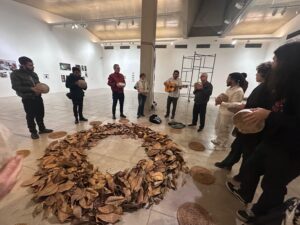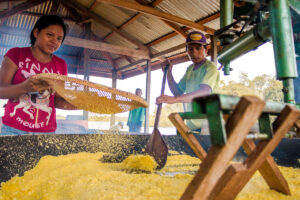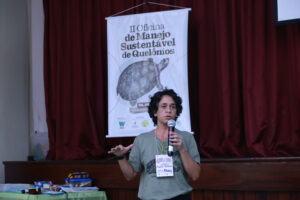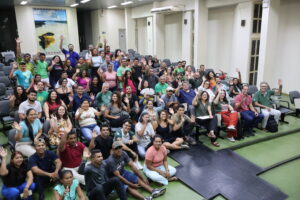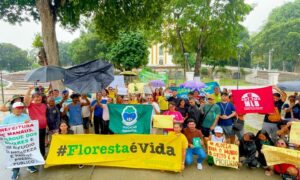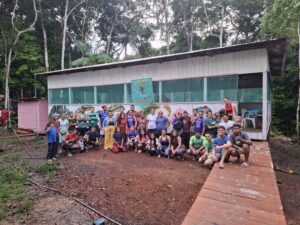Por Clara Machado
Extractive women have their freedom limited either by the obedience they owe to their father and, after marriage to their husband, or by the lack of involvement in decisions on how to spend the income produced collectively by the family. Despite participating in the various tasks of swidden agriculture, fishing and extractivism, the care of the home and children is never shared with men. The unpaid work of home care, carried out full-time, often prevents them from being able to organize or carry out other activities that generate income. We invite Quilvilene Figueiredo da Cunha, the president of the Association of Agroextractive Women of the Middle Juruá (ASMAMJ), to talk about how the activities promoted by this association have aroused in women the desire to organize themselves in search of equality. ASMAMJ currently has 164 members from 32 different communities, is an integral part of the Mid-Juruá Territory Forum, and is increasingly winning female participation in decision-making spaces.
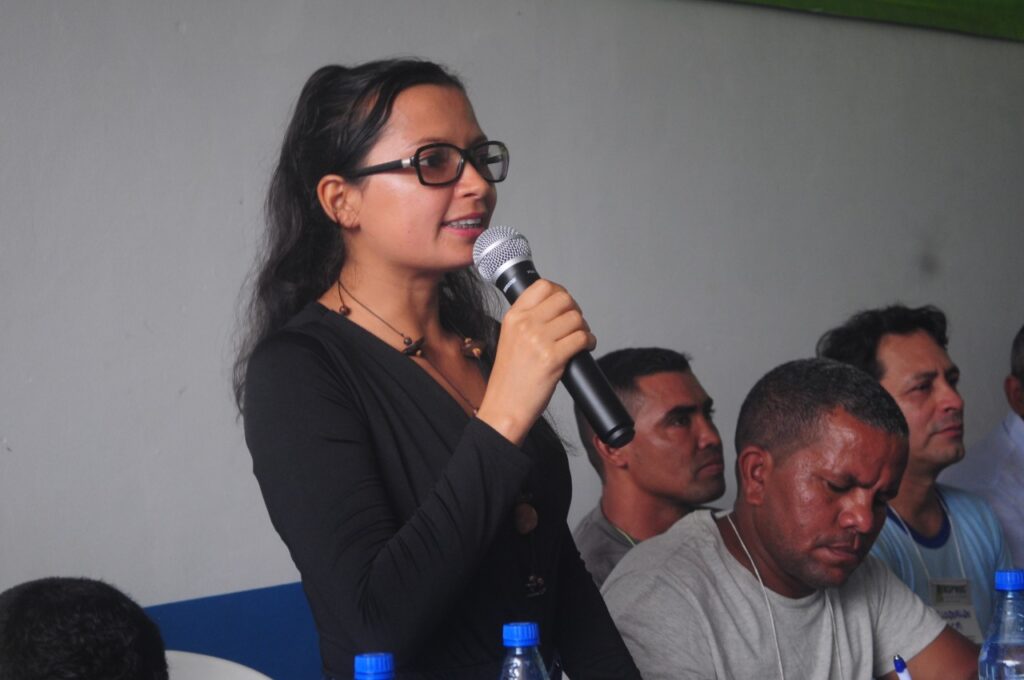
INSTITUTO JURUÁ: Please introduce yourself, talk a little about ASMAMJ?
QUILVILENE: My name is Quilvilene Figueiredo da Cunha, I’m 26 years old. The Women’s Association was founded in 2004, and has been walking almost dragging. Until 2017, when we resumed activities and now we are progressing much better!
INSTITUTO JURUÁ: What were the changes that ASMAMJ went through since its creation until now?
QUILVILENE: The main change is that women are more interested today, they are more involved. And now they realize that things were previously considered cultural, and were sometimes accepted even if they were not right Today they want change.
INSTITUTO JURUÁ: Has ASMAMJ’s proposal changed over time?
QUILVILENE: The Middle Juruá Territory has a very beautiful history as an organization, in which women participated, but only behind the scenes. And this participation was never recognized. Whenever we hear about the Middle Juruá, the women are never mentioned, because they were behind the scenes making food for their husbands, or they were at home with the children so that the husband could participate in the organizations. And so ASMAMJ came to give visibility to the work of women.
INSTITUTO JURUÁ: And what is your background before you became president of ASMAMJ?
QUILVILENE: I participated in the Young Protagonists programme, when it first began in the Middle Juruá in 2012. The Young Protagonists work in the training and preparation of young people to be leaders. It is a means of continuing the process of organizing the Middle Juruá.
INSTITUTO JURUÁ: In this pandemic moment, is ASMAMJ managing to get together and keep the association functioning in some way?
QUILVILENE: We are working online. ASMAMJ participates in a mentoring programme in collaboration with SITAWI that has been very important for our development. We get together, for example when we need support to write a project, and we have the support of SITAWI. I then communicate with other women who do not have access to the internet by radio and we have adapted to work like this.
INSTITUTO JURUÁ: You said that women started not to accept some more things that were naturalized before. For you, what is the importance that ASMAMJ has in the lives of women today? Do you think their attitude has changed? And how did ASMAMJ influence this process?
QUILVILENE: In any community where you asked who was the head of the family, the answer would be the man. The woman works together, does the gardening activities together, but she is considered as only a helper. Who decides how to spend the family income, which was produced together, is the man because he is the head of the family. So, in all income-generating activities, it is never the woman who decides how she will spend, and often the money is hers. Now women are more independent. It started by recognizing this, and now, in management, women work, earn their own money separately and can decide how they are going to spend. The woman has to obey the father and the mother, the father mainly, and when she marries she has to obey her husband. This was preached in the Middle Juruá as our culture. And as it is something that has been in place a long time, change will not happen at once. At meetings now we have testimonials from women who say “My husband didn’t want me to come, but I come anyway, I don’t even care!” So, this process is already happening. It is very difficult for them to leave the house, because they are the ones who take care of the child and the house, and so it is always considered easier for the man to leave. A women’s association does not mean that women are against men. Just as in the past women supported men in this process of organizing the Middle Juruá, we want them to support us now. In our meetings there are a lot of children, because mothers attend and need to bring their children. And the children are very welcome – we ask girls from the Associação Vagalume to take care of the children during the meeting. But there is this difference, because no man goes to meetings with children, but women need to take them, as if the responsibility for taking care of the kids was only for the woman.
INSTITUTO JURUÁ: In the management of pirarucu women play a super important role in the processing and cleaning of fish, which generates income directly for them. Are there other activities for which women are paid?
QUILVILENE: Specifically, where money is earned independently by the woman, and where the man earns separately, the management of the pirarucu is the only current example. Another activity is the collection of seeds for plant oils, which some women do separately from the husband, but here there is always that question, most of the time it is still the husband who decides how he will spend the money. And in other activities, which are conducted by the family and where the woman performs the same work as the man, they are seen as helpers.
INSTITUTO JURUÁ: Have you thought about activities that could generate income for women?
QUILVILENE: The association is starting to produce artisanal andiroba oil, which has been sent to the laboratory for testing, and if everything goes well we will start selling. The Nova Esperança Association (AANE) is starting to work with handmade soap. Oil is a product that they are strongly involved in as it has been established for a long time, but soap is a new thing and is moving more slowly.
INSTITUTO JURUÁ: ASMAMJ is participating in the Fórum do Território Médio Juruá (Middle Juruá Territory Forum). How is this participation going? Are women able to participate more actively in the decisions made at the Forum?
QUILVILENE: We are progressing little by little, although still not as strong as we should be. But we are already participating more than before, and now we have more training in our planning.
INSTITUTO JURUÁ: What are the main challenges that ASMAMJ faces to bring greater participation of women in its activities?
QUILVILENE: As they are not used to attending meetings, support at home would be important, with husbands supporting them to participate. There are many cases in which the husband prevents the wife from being here, and there are cases in which he does not, but also does not help. That is the kind of support we need. And some who participate are still a little shy.
INSTITUTO JURUÁ: What are your dreams for ASMAMJ?
QUILVILENE: I hope that the association will grow and that we will achieve our goal of empowering women to change this situation. And also that we can generate income so that they have financial autonomy, because what makes women more dependent is this financial issue. The Mid-Juruá would be much better, because women already helped the region to become more developed and to gain more rights, and so if more women were to join with people who are already struggling, then we could make something that is good, even better. In this way, we would be more free.

